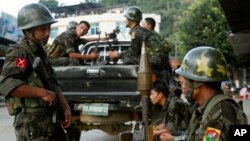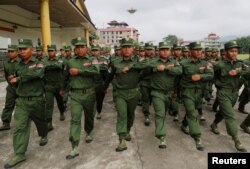China's special envoy for Asian affairs met with two groups of ethnic armies Tuesday in an attempt to quell fighting along the Myanmar-China border.
Recent fighting in the Kokang Region in Myanmar's Northern Shan State, near Chinese territory, has left dozens dead and sent a host of refugees fleeing across the border.
At the sessions in Kunming, the capital of China's Yunnan Province, Sun Guoxiang met with the United Wa State Army (UWSA) — the largest armed ethnic group — on Tuesday morning before meeting with members of the Northern Alliance. That includes the Arakan Army (AA), the Kokant or Myanmar National Democratic Alliance Army (MNDAA), the Ta'ang National Liberation Army (TNLA) and the Kachin Independence Army (KIA).
The AA's Colonel Nyo Tun Aung told VOA Burmese that Sun urged an end to fighting, which was causing instability along China's border.
The groups that met with Sun had urged China and the United Nations to join the internal peace process overseen by Myanmar's de facto leader, Noble Peace Prize winner Aung San Suu Kyi. She wants to bring all ethnic armed groups into the government-sponsored peace process through the signing of a nationwide cease-fire agreement. None of the groups that attended the Tuesday sessions have signed the agreement.
China's concern about the fighting arises in part from its "One Belt, One Road" initiative, designed to improve regional access to world markets. Part of the multi-billion-dollar infrastructure project is expected to cross Myanmar on the way to a deep-water port in the Indian Ocean. Fighting in the Kokang region between the ethnic armies and the Myanmar military is disrupting the plan.
At both meetings, Nyo said Sun asked "what he could do" to mediate among the three parties — the Myanmar military, the ethnic groups and the Myanmar government.
"It's kind of a bridge process ... mainly because China wants the conflict resolved," Nyo said.
Hla Kyan Zaw, a Myanmar analyst based in Kunming, said, "I assume China will do whatever they can to have peace in the area."
Since late November, Myanmar and China have held two high-level meetings in which their foreign affairs ministries and defense ministries discussed border security.
In December, the four rebel groups and Myanmar officials were invited to Kunming, but talks fell through soon after the participants arrived.
Tension between the central government and ethnic militias in the northern region near China's Yunnan province erupted March 6 in Laukkai, capital of the Kokang special region and an important trading town on the Salween River, which forms Myanmar's border with China.
China has offered $3 million to support peace talks, and its diplomats are urging the government and all ethnic-group armies to sign an inclusive nationwide cease-fire.





